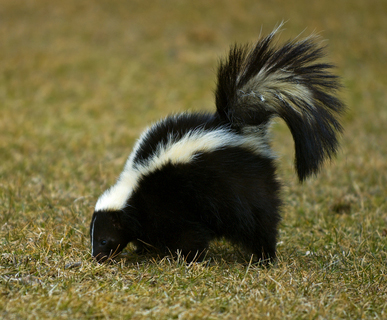Skunks rarely show fear of people as they are born and raised in our backyards. Though you may see them during the day, they are largely nocturnal animals that search for food after sunset. They are nearsighted animals with a keen sense of hearing and smelling. If skunks are cornered by a stranger and they are unable to flee, they begin to stamp their forepaws while scratching the ground as a warning. When they display this behavior, you should back away slowly and quietly.
Discouraging techniques
To discourage skunks, you could remove attractants from your home. These include cat or dog food left outside at night, open compost piles, fruit trees, a pond and vegetable gardens. Opening that are under concrete slabs, elevated sheds as well as crawl spaces under houses can attract skunks as they are ideal for dens.
Oscillating sprinklers that are motion sensitive are also effective in deterring wildlife. There are both smell and taste repellants that can be used in the target area. Another option is to place stations of regular household ammonia stations around the yard in an area frequented by the skunks. When dealing with skunk families, it is recommended that you give the mother time to wean the young ones. Avoid trapping them when they are nesting. When the time comes to expelling them comes, consider using a mild deterrent such as a loud radio to accelerate their departure from the den.
Check your property regularly to ensure that there are no openings and vents where skunks can crawl through. With skunks being rodent predators that follow mice and rats, preventing the infestation of these predators will deny them food and thus a habitation. Woodpiles should be kept elevated from the ground. Since they do not climb, fencing is an effective method of deterring them from your yard. Also secure metal trash containers to keep skunks from moving onto your property.
